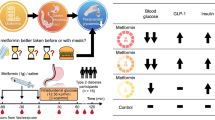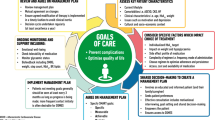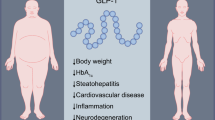Abstract
Background
The surgical treatment of obesity ameliorates metabolic abnormalities in patients with type 2 diabetes. The objective of this study was to evaluate the early effects of Roux-en-Y gastric bypass (RYGB) on metabolic and hormonal parameters in patients with type 2 diabetes (T2DM).
Methods
Ten patients with T2DM (BMI, 39.7 ± 1.9) were evaluated before and 7, 30, and 90 days after RYGB. A meal test was performed, and plasma insulin, glucose, glucagon, and glucagon-like-peptide 1 (GLP-1) levels were measured at fasting and postprandially.
Results
Seven days after RYGB, a significant reduction was observed in HOMA-IR index from 7.8 ± 5.5 to 2.6 ± 1.7; p < 0.05 was associated with a nonsignificant reduction in body weight. The insulin and GLP-1 curves began to show a peak at 30 min after food ingestion, while there was a progressive decrease in glucagon and blood glucose levels throughout the meal test. Thirty and 90 days after RYGB, along with progressive weight loss, blood glucose and hormonal changes remained in the same direction and became more expressive with the post-meal insulin curve suggesting recovery of the first phase of insulin secretion and with the increase in insulinogenic index, denoting improvement in β-cell function. Furthermore, a positive correlation was found between changes in GLP-1 and insulin levels measured at 30 min after meal (r = 0.6; p = 0.000).
Conclusion
Our data suggest that the RYGB surgery, beyond weight loss, induces early beneficial hormonal changes which favor glycemic control in type 2 diabetes.


Similar content being viewed by others
References
Sjostrom L, Lindroos A, Peltonen M, et al. Lifestyle, diabetes and cardiovascular risk factors 10 years after bariatric surgery. N Engl J Med. 2004;351(26):2683–93.
Pories WJ, Swanson MS, MacDonald KG, et al. Who would have thought it? An operation proves to be most effective therapy for adult onset diabetes mellitus. Ann Surg. 1995;222(3):339–50. Discussion 350–52.
Pories WJ, MacDonald KG, Morgan EJ, et al. Surgical treatment of obesity and its effect on diabetes: 10-y follow-up. Am J Nutr. 1992;55(2 Suppl):582S–5S.
Schauer PR, Burguera B, Ikramuddin S, et al. Effect of laparoscopic Roux-en Y gastric bypass on type 2 diabetes mellitus. Ann Surg. 2003;238(4):467–84.
Rubino F, Marescaux J. Effect of duodenal-jejunal exclusion in a non-obese animal model of type 2 diabetes: a new perspective for an old disease. Ann Surg. 2004;239(1):1–11.
Rubino F, Schauer PR, Kaplan LM, et al. Metabolic surgery to treat type 2 diabetes: clinical outcomes and mechanisms of action. Annu Rev Med. 2010;61:393–411.
Buchwald H, Avidor Y, Braunwald E, et al. Bariatric surgery: a systematic review and meta-analysis. 2004;292(14):1724–37.
Jazet IM, Pijl H, Frölich M, et al. Two days of a very low calorie diet reduces endogenous glucose production in obese type 2 diabetic patients despite the withdrawal of blood glucose-lowering therapies including insulin. Metabolism. 2005;54(6):705–12.
Jazet IM, Ouwens DM, Schaart G, et al. Effect of a 2-day very low-energy diet on skeletal muscle insulin sensitivity in obese type 2 diabetic patients on insulin therapy. Metabolism. 2005;54(12):1669–78.
Isbell JM, Tamboli RA, Hansen EN, et al. The importance of caloric restriction in the early improvements in insulin sensitivity after roux-en-y gastric bypass surgery. Diabetes Care. 2010;33(7):1438–42.
Mithieux G, Misery P, Magnan C, et al. Portal sensing of intestinal gluconeogenesis is a mechanistic link in the diminution of food intake induced by diet protein. Cell Metab. 2005;2:321–9.
Mithieux G, Bady I, Gautier A, et al. Induction of control genes in intestinal gluconeogenesis is sequential during fasting and maximal in diabetes. Am J Physiol Endocrinol Metab. 2004;286:E370–5.
Mithieux G, Andrelli F, Magnan C. Intestinal gluconeogenesis: key signal of central control of energy and glucose homeostasis. Curr Opin Clin Nutr Metab Care. 2009;12:419–23.
Troy S, Soty M, Ribeiro L, et al. Intestinal gluconeogenesis is a key factor for early metabolic changes after gastric bypass but not after gastric lap-band in mice. Cell Metab. 2008;8:201–11.
Rubino F, Forgione A, Cummings DE, et al. The mechanism of diabetes control after gastrointestinal bypass surgery reveals a role of the proximal small intestine in the pathophysiology of type 2 diabetes. Ann Surg. 2006;244:741–9.
Hickey MS, Pories WJ, MacDonald Jr KG, et al. A new paradigm for type 2 diabetes mellitus: could it be a disease of the of foregut? Ann Surg. 1998;227:637–43. discussion 43–4.
Naslund E, Backman L, Holst JJ, et al. Importance of small bowel peptide for the improved glucose metabolism 20 years after jejunoileal bypass for obesity. Obes Surg. 1998;8:253–60.
Thaler JP, Cummings DE. Minireview: hormonal and metabolic mechanisms of diabetes remission after gastrointestinal surgery. Endocrinology. 2009;150(6):2518–25.
Kashyap SR, Daud S, Kelly KR, et al. Acute effects of gastric bypass versus gastric restrictive surgery on beta-cell function and insulinotropic hormones in severely obese patients with type 2 diabetes. Int J Obes (Lond). 2009;34(3):462–71.
Le Roux CW, Aylwin SJ, Batterham RL, et al. Gut hormone profiles following bariatric surgery favor an anorectic state, facilitate weight loss, and improve metabolic parameters. Ann Surg. 2006;243(1):108–14.
Holdstock C, Zethelius B, Sundbom M, et al. Postprandial changes in gut regulatory peptides in gastric bypass patients. Int J Obes. 2008;32(11):1640–6.
Laferrère B, Teixeira J, McGinty J, et al. Effect of weight loss by gastric bypass surgery versus hypocaloric diet on glucose and incretin levels in patients with type 2 diabetes. J Clin Endocrinol Metab. 2008;93(7):2479–85.
Wang TT, Hu SY, Gao HD, et al. Ileal transposition controls diabetes as well as modified duodenal jejunal bypass with better lipid lowering in a nonobese rat model of type II diabetes by increasing GLP-1. Ann Surg. 2008;247(6):968–75.
Alam ML, Van der Schueren BJ, Ahren B, et al. Gastric bypass surgery, but not caloric restriction, decreases dipeptidyl peptidase-4 activity in obese patients with type 2 diabetes. Diabetes Obes Metab. 2011;13:378–81.
Laferrère B, Heshka S, Wang K, et al. Incretin levels and effect are markedly enhanced 1 month after Roux-en-Y gastric bypass surgery in obese patients with type 2 diabetes. Diabetes Care. 2007;30:1709–16.
Boden G. Free fatty acids—the link between obesity and insulin resistance. Endocr Pract. 2001;7(1):44–51.
Ruan H, Lodish HF. Regulation of insulin sensitivity by adipose tissue-derived hormones and inflammatory cytokines. Curr Opin Lipidol. 2004;15(3):297–302.
Wajchenberg BL. Beta-cell failure in diabetes and preservation by clinical treatment. Endocr Rev. 2007;28(2):187–218.
Manfredini G, Ermini M, Scops L, et al. Internal biliary diversion improves glucose tolerance in the rat. Am J Physiol Gastrointest Liver Physiol. 1985;249:G519–27.
Patti ME et al. Serum bile acids are higher in humans with prior gastric bypass: potential contribution to improved glucose and lipid metabolism. Obesity. 2009;17:1671–7.
Wang PYT, Caspi L, Lam CKL, et al. Upper intestinal lipids trigger a gut–brain–liver axis to regulate glucose production. Nature. 2008;452:1012–6.
Lima MMO, Pareja JC, Alegre SM, et al. Acute effect of Roux-en-y gastric bypass on whole-body insulin sensitivity: a study with euglicemic-hyperinsulinemic clamp. J Clin Endocrinol Metab. 2010;95(8):3871–5.
Furet JP, Kong LC, Tap J, et al. Differential adaptation of human gut microbiota to bariatric surgery-induced weight loss: links with metabolic and low-grade inflammation markers. Diabetes. 2010;59(12):3049–5.
Conflict of Interest
The authors declare that they have no conflict of interest.
Author information
Authors and Affiliations
Corresponding author
Rights and permissions
About this article
Cite this article
Umeda, L.M., Silva, E.A., Carneiro, G. et al. Early Improvement in Glycemic Control After Bariatric Surgery and Its Relationships with Insulin, GLP-1, and Glucagon Secretion in Type 2 Diabetic Patients. OBES SURG 21, 896–901 (2011). https://doi.org/10.1007/s11695-011-0412-3
Published:
Issue Date:
DOI: https://doi.org/10.1007/s11695-011-0412-3




